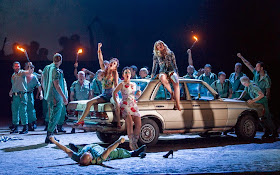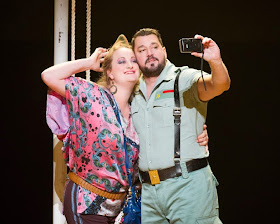 |
| Carmen Act 4 - ENO - photo Alastair Muir |
Reviewed by Robert Hugill on May 20 2015
Star rating:
Dystopic vision of Carmen, brought to life by vibrantly gripping performances.
Revivals can often bring productions into a different focus, and English National Opera's current revival of Calixto Bieito's production of Bizet's Carmen (seen Wednesday 20 May 2015) had a new conductor, Sir Richard Armstrong, and new leads, Justina Gringyte as Carmen and Eric Cutler as Don Jose. Eric Cutler was making his ENO debut with Justina Gringyte making her role debut. They were supported by a strong cast, with Leigh Melrose as Escamillo, Eleanor Dennis as Micaela, Graeme Danby as Zuniga, George Humphreys as Morales, Rhian Lois as Frasquita, Clare Presland as Mercedes, Geoffrey Dolton as Dancairo, Alun Rhys-Jenkins as Remendado and Toussaint Meghie as Lilas Pastia. Calixto Bieito's production, designed by Alfons Flores (sets, realised by Kieron Docherty), and Merce Paloma (costumes), revived by Joan Anton Rechi and sung in Christopher Cowell's English translation, is much travelled and originally dates from 1999. It sets the piece in the 1970's in the dying days of Franco's regime in a place which is recognisably Spain but is a grim marginal border region and lacking in the folkloric glamour we associate with the work. It is a bleak, dystopic vision which worked because of the grippingly vibrant performances which complemented the music.
 |
| Justina Gringyte, Eric Cutler - photo Alastair Muir |
This was a world of smugglers living in cars, bored soldiers being cruelly punished, fights, violence and sex for money. No-one was admirable, Carmen (Justina Gringyte) is clearly on the make using sex as a tool to work her way up, you were never sure when she was playing or when she was real. Don Jose (Eric Cutler) was a strong, silent giant who struggled with anger issues and was clearly not the brightest penny. Escamillo (Leigh Melrose) was more a two-bit spiv than a real super-star and very much just a local hero. It was shocking in its way, but the miraculous thing was that Calixto Bieito staged Bizet's music just as it is. Unlike some productions, he did not falsify music or plot, he found what he wanted in Bizet's score and made sense of the numerous little awkward moments which other directors have to finesse. It worked, because Bizet's music became partly the character's inner life, the vibrant colourful Spain which was more a concept than reality.
We opened with Lilas Pastia (Toussaint Meghie) in a dodgy white suit doing a cheap magic trick. He was clearly something of a pimp,and Bieito made the role both non-speaking and ubiquitous. Lilas Pastia's bar was simply a case of drink by an open topped car for the use of the clients of his girls, Frasquita (Rhian Lois), Mercedes (Clare Presland) and Carmen. He cropped up at various times in curious places, a man with fingers in pies. Each act started with a visual gesture, Act 2 had Mercedes daughter all alone, dancing for her doll (she later pimped for her mother). Act 3, with its huge cut out bull advert, had a naked young man pretending to be a bull fighter. We never worked out if he was a real one or just pretend. Act 4 opened with Lilas Pastia organising the soldiers to dismantle the bull, ending up with him mock bull-fighting with the soldiers carrying the head of the bull.
 |
| Lilas Pastia's bar - Carmen act 2 Justina Gringyte, Rhian Lois, Clare Presland and company photo Alastair Muir |
Eric Cutler was certainly a great find. He is moving into more dramatic territory (with Fidelio and Lohengrin coming up) and his Don Jose had a rugged, rough-hewn quality to it but with a vitality too. This matched the character, a tongue-tied bloke who exploded when he could not communicate. The flower song was nicely expressive and eloquent, and Eric Cutler knows how to shade off his voice at the top when needed. He and Justina Gringyte really struck sparks off each other. It helped that he is tall and well built (taller than Justina Gringyte in heels, and she is not small).
 |
| Leigh Melrose - photo Alastair Muir |
 |
| Eleanor Dennis, Eric Cutler - ENO - photo Alastair Muir |
The other singers were all vivid characters in the drama with their music part and parcel (with dialogue cut to a minimum we heard far less from some than is usual). Frasquita and Mercedes (Rhian Lois and Clare Presland) made two rather desperate tarts but their trio in Act 3 with Carmen was thrilling, the two girls attitudes contrasting aptly with that of Carmen, and with Justina Gringyte really making this count in her dark portrayal of Carmen. Graeme Danby made a gloriously sleazy Zuniga, with George Humphreys as a handsome moral-less Morales. Both Geoffrey Dolton and Alun Rhys-Jenkins looked their parts as Remendado and Dancairo, but he heard little from them except their musical characterful contributions.
The final act was brilliantly and economically staged. At the opening Lilas Pastia drew a huge circle on the ground, suggestive of the bull ring. For the big crowd scene, the chorus surged forward to the edge of the stage and we experienced the parade via the music and in the reflection of their intense reactions, In the final moments Eric Cutler and Justina Gringyte were alone, at the centre of the circle, for a powerful and evocative ending full of resonances.
The large chorus was on thrilling form with strong and disciplined singing throughout and some stunning moments, It wasn't just the big crowd scenes which counted, but every little moment and they were firmly behind Richard Armstrong's tight yet vibrant account of the score. They were joined by a large group of actors with many shirtless moments (and more), the men were generous with their physical charms. Under Richard Armstrong, the orchestra was in sterling form, giving a vital yet disciplined account of the score without a flabby moment.
I enjoyed Christopher Cowell's imaginative yet direct translation. Cowell had found neat solutions to the stress problems caused by translating from French,and his language was demotically direct yet poetic. Diction was admirable throughout, this was one of those evenings when we hardly needed the subtitles.
Ultimately this was Richard Armstrong, Justina Gringyte and Eric Cutler's evening, and between them they gave us some thrilling moments, in an evening of gripping drama.
This review also appears on Operaoday.com
Elsewhere on this blog:
- Finely crafted: Till the stars fall - CD review
- Heroic indeed: Bryan Hymel Heroique - CD review
- Show-stopping: Jessic Pratt at Rosenblatt Recitals - concert review
- Vivaldi's Women in action: A visit to the Pieta - concert review
- Post-minimal modes: Michael Vincent Waller - CD review
- Day two, Baroque women as performers and composers: London Festival of Baroque Music - concert review
- London Festival of Baroque Music: Bach Collegium Japan - concert review
- Tintinnabuli: The Tallis Scholars in concert - concert review
- Keeping the balance: Iestyn Morris talks about Peter Pan - interview
- Vital and engaging: Rachel Podger and Brecon Baroque - concert review
- Straight or swung? Cole Porter songbook - CD review
- Interesting mix: guitarist Christina Sandsengen's Shades and Contrasts - CD review
- Home

No comments:
Post a Comment